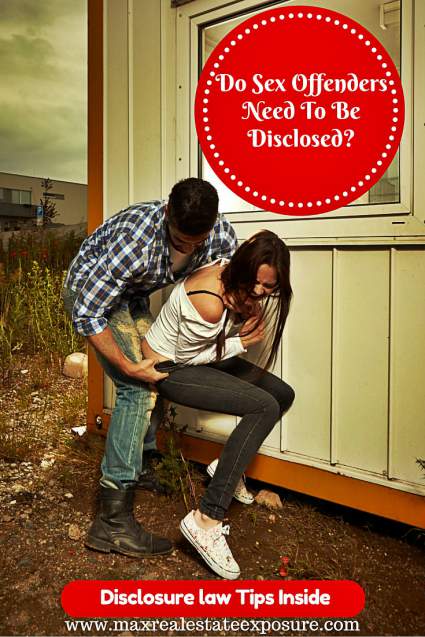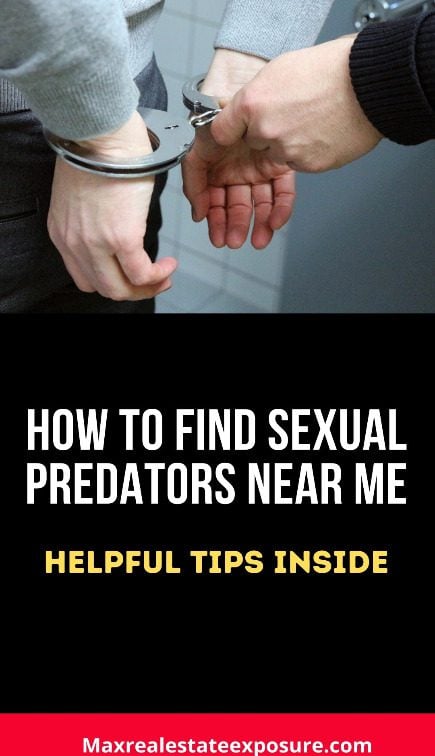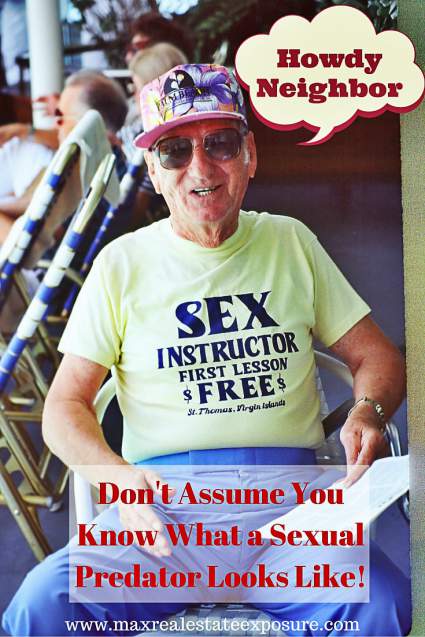Do sexual offenders near me have to be disclosed when selling a home? That is an excellent question! 
As a seller or a seller’s agent, you must understand the rules surrounding disclosure before you start speaking to potential buyers.
Whether there are sexual predators nearby is undoubtedly a question that could come up when selling a home.
You must know what you are legally obligated to disclose about the home and neighborhood as you interact with buyers. Failing to be honest about specific negative issues can have disastrous legal and financial consequences.
Selling the house for a reasonable price is essential, but so is protecting yourself from lawsuits.
One subject that can be challenging for sellers and their agents is sex offenders. Understanding disclosure in real estate is essential, especially regarding predators and offenders.
When considering moving to a new neighborhood, I advise you check for any registered sex offenders in the area to ensure your family’s safety.
As a Massachusetts real estate agent who has been representing buyers and sellers for the past thirty-eight years, I have some sound advice. When you’re worried about a sexual offender or predator being in a particular neighborhood, go to the local police station and ask. The police will have detailed records on file. You should not rely on a Realtor to provide this information. Careful due diligence when buying real estate in this matter is required.
Not only is finding this information essential for safety but it’s a factor that can negatively impact the market value of a property.
Let’s review everything you need to know.
Facts and Figures
1. Sex offender registries exist to help communities track and monitor individuals convicted of sex crimes.
2. Access to sex offender information is usually available for public safety purposes.
3. The presence of a registered sex offender near a particular location does not guarantee a threat or risk to that area.
4. It is essential to understand the specific laws and regulations regarding sex offenders in your state.
5. Maintaining awareness and taking necessary precautions can contribute to ensuring personal safety and community well-being.
6. There is an estimated average of 1 sex offender per square mile in urban areas.
7. Approximately 22% of registered offenders have reoffended within 10 years.
8. Studies suggest that about 15% of sex offenses are committed by strangers.
9. It is estimated that around 8% of reported sexual assaults are perpetrated by individuals known to the victim.
10. Research shows that the average age at which individuals engage in their first sexual offense is 26.
Questions About Disclosing Sexual Offenders Near Me
- When selling a home, do you need to disclose the presence of a sexual offender in the neighborhood?
- Do you need to tell the buyer even if he or she doesn’t ask?
- What if you aren’t sure there are any sex offenders in the area?
- Do you need to find out before selling the home?
The answers to these and other questions about sex offender disclosure can vary from state to state, but there are some general guidelines you can follow to protect yourself through the sales process.
A buyer could decide to terminate the sale after completing their due diligence.
Sexual Predators Definition
A person who engages in predatory or abusive behavior to gain sexual contact with another individual is defined as a sexual predator.
It could include attempting to forcibly gain sexual intimacy. The purpose is to not only to seek sexual gratification but also to demonstrate dominance over the other person. In many cases, children may be targeted by sexual predators.
Like predatory behavior in the animal kingdom, experts believe that those who commit sexual offenses, such as rape or child abuse, utilize a similar approach to acquire victims. These individuals are typically referred to as sexual predators.
Sexual Predators Are Different From Sexual Offenders
The terms “sexual offender” and “sexual predator” are often viewed differently. In some U.S. states, there is a distinction between these terms. The distinction is that a “sexual offender” is defined as someone who has committed a sexual offense.
On the other hand, “sexual predator” typically describes an individual who regularly seeks out exploitative sexual situations.
In certain states in the United States, the title “sexual predator” is utilized for individuals convicted of particular offenses, regardless of whether or not there is a preceding record of this kind of conduct.
For example, in some states, a person convicted of sex crimes against minors is referred to as a sexual predator, whether the crime is violent or committed against a young child vs a teenager. Understanding the difference between a sexual predator and a sex offender is important for accurately assessing the potential risk in your neighborhood.
How to Find Sexual Predators and Offenders Near Me?
 When you are buying or selling a home and want to find out if there are sex offenders or predators nearby, the best method is a Google search. Either sexual offenders near me or sexual predators near me will work well.
When you are buying or selling a home and want to find out if there are sex offenders or predators nearby, the best method is a Google search. Either sexual offenders near me or sexual predators near me will work well.
You will see numerous sites that review how to discover these creeps. We will be covering some of the most well-known sites extensively below.
As I mentioned, visiting the local police department can also help verify any information you’ve uncovered.
Understanding the Impact of Registries on Community Safety
The presence of a sex offender in a community can understandably cause concern among residents. It emphasizes the importance of sex offender registries in maintaining public safety.
These registries, established under laws such as Megan’s Law, are designed to provide the public with critical information about individuals convicted of sex crimes.
With access to these registries, families can make informed decisions about their living situations. They wille be able to and safely navigate a home purchase.
It’s crucial, however, to approach this information with a nuanced understanding. Not all individuals listed on a sex offender registry pose an equal risk to the community.
The three-tier system used in some states which I will discuss, helps to differentiate the level of risk of different offenders. This information can be valuable when planning safety for children, such as routes to school or play areas.
Engaging with community safety initiatives and utilizing tools like the NSOPW mobile application or Family Watchdog can help your efforts to protect your family.
These resources allow for easy access to offender information. They also encourage empowerment and vigilance within communities.
What is Megan’s Law
Megan’s Law was enacted in New Jersey in 1994 in response to the rape and murder of a seven-year-old girl named Megan Kanka. Megan’s Law has made it possible for families to access information about registered sex offenders online, providing an additional layer of security.
A convicted sex offender had moved into Megan’s neighborhood without the knowledge of Megan’s family. The state of New Jersey determined that registering convicted sex offenders with local police departments was a good idea. The goal was to ensure that surrounding communities knew of the presence of the sex offender. The open knowledge would help prevent tragedies like what happened to Megan.
Only a few years later, in 1996, a regulation similar to Megan’s Law was enacted nationally. The federal law required that the Attorney General give guidelines to states that would ensure similar reporting of sex offenders in every state.
Sex offenders must report to local law enforcement when they move to an area and re-register should they move to another state.
Local jurisdictions can vary in how they distribute information on registered sex offenders to the surrounding community. Local law enforcement must release information to protect the public, but how each organization does so is left up to local authorities.
Megan’s Law And Real Estate Disclosure
When selling a home, there can be various issues with the property that you can choose to disclose or not to disclose. Each item can vary in how severely it affects the home and the buyer.
A cracked tile in a bathroom may not be worth mentioning, while a flooding basement may be something you must bring up to avoid problems following the sale.
Another similar real estate disclosure issue is whether or not you must disclose stigmatized properties. The answer can be different from state to state. The same would hold true about disclosing paranormal activity or a suspected haunted house.
The presence of a sex offender in the area surrounding the home is one more possible issue that might need disclosure, depending on the circumstances and the laws in your area.
The number one rule about disclosure, sex offender or otherwise, is to know the laws in your area. But to be clear, every state has some requirements for disclosing issues with a home, particularly if you are asked directly about these matters.
It is always a good idea to be honest about any problem if the buyer asks you directly about it. But what if you are not asked directly? What if you don’t know the answer, particularly about sex offenders?
Factors That Can Affect Disclosure
How you, as a seller or an agent, deal with the disclosure of sexual offenders can vary considerably based on your situation. There are several factors to consider:
What Are The Local Laws?
The laws in each area relating to sex offenders can vary, which means the area where you are selling your home may or may not have specific guidelines about disclosure.
Your real estate agent should know these laws and how to apply them to your circumstances.
Do You Have Knowledge of Them?
You may not know whether there are sex offenders in the area or not. No specific federal laws require that law enforcement publishes information about sex offenders in the area, so your area may not put out information regularly on the subject.
The local police department will have the information available should you ask, but you may have never had reason to question before.
The Buyer May or May Not Ask About Sexual Offenders or Predators
The potential buyers of your home may not ask you about sex offenders in the area. Or they may ask. The important thing is that you know what you will do if the questions come or not.
Dealing With Different Disclosure Scenarios
 How you will handle the issue of sex offender disclosure will depend on your situation.
How you will handle the issue of sex offender disclosure will depend on your situation.
For instance, if you do not have any knowledge of sex offenders in the area (such as if the local law enforcement agencies do not notify communities regularly) and the buyer does not ask about sex offenders in the area, in most cases, you will not be required to bring up the subject.
What if the buyer does ask, but you don’t know?
In this situation, you can refer the customer to the local law enforcement agency for further inquiry.
If you don’t know, that is OK. You can be honest about this and point the buyer in the right direction to obtain the information.
What is The Sexual Offenders Register?
The National Sex Offender Registry provides public information in all fifty states about the presence of sexual offenders.
The Dru Sjodin National Sex Offender Public Website (NSOPW) is a groundbreaking public safety resource that provides the public with access to nationwide sex offender data.
NSOPW is a joint effort between the U.S. Department of Justice and state, territorial, and tribal governments designed to protect adults and children.
The sexual offender’s registry allows members of the public to search through participating websites for information about individuals convicted of sexually violent offenses against adults and children, as well as certain sexual contact and other crimes against minors.
It is an opportunity for the public to become informed about potential offenders in their local communities. You can use the sexual offender registry to search for sexual offenders near you.
What is a Family Watchdog?
Family Watch Dog’s excellent site provides public information regarding sexual offenders in a particular area. Family Watchdog also provides a free service to assist in locating registered sex offenders and other types of offenders near your location.
Their site encourages everyone to use its resources to empower their families by providing knowledge about potential risks in areas they frequent regularly.
Visit the site, enter the street where you’re looking to purchase, and it will tell you if there are any sexual offenders in the area. It’s a pretty nifty tool to have.
Your local law enforcement agency may publish information about sex offenders in the area as well.
In this case, you must convey the information you know if asked. Keep in mind that sexual predators come in all shapes and sizes. Do not pretend to think you know that the neighborhood must be perfect because nobody looks like the type to be one.
There is no”type” when it comes to a sexual deviant. The guy who looks like your average grandfather could be a wolf in sheep’s clothing. Nobody is going to seem like a sex offender blatantly. However, if you see a T-shirt like this one, you might think otherwise.
To do a sexual offenders and predators search, give Family Watchdog a try. You can also try the sexual predator’s map feature at Criminal Watch Dog. Signing up for offender notifications can keep you updated on any registered sex offenders moving into or out of your area.
Making an Effort to Find Out if There Are Sex Offenders Near Me
Should you try to discover if there are sexual predators or offenders near your home?
As the homeowner, you could ask the local law enforcement agency about the presence of sex offenders before selling the home. But you do not have to, either. Plenty of homeowners never think to ask this question and plenty of buyers don’t either. It is up to you whether you seek out this information.
If you are a real estate agent, you are under no obligation to verify the presence of sex offenders for every home you sell. You can refer buyers to the source of this information.
Of course, if you do know the presence of a sexual offender, you should say something if asked.
The Neighborhood is Everything in House Sales
Most real estate agents will tell you that the area in which you live makes a huge difference. It’s valuable not only in the quality of your life but also financially when it comes time to sell.
The adage about the location being everything is correct. So, how do you pick a neighborhood that will stand the test of time? Please take a look at the helpful article that details everything under the sun when it comes to choosing a quality location.
There are obviously many different factors when selecting the right neighborhood for your needs. The quality of schools, crime rate, access to highways, are at the top of most buyers wishlist.
If you can help it, choosing your neighbors wisely is essential. Down the road, the last thing you will want to consider is how to sell a home with a bad neighbor.
Real Estate Agents Share Opinions On Picking Neighborhoods
Anita Clark, a Realtor in Warner Robbins, GA, says, “There are few things more critical for buyers than choosing the right neighborhood.
It determines the schools their kids will attend, provides a sense of community, and plays a significant role in their home’s future resale value. If you have prioritized your needs/wants, picking a quality neighborhood is easier than you think.” Anita provides considerations for selecting a top neighborhood.
Kyle Hiscock, a Realtor in Rochester, NY, says, “Selecting the right area when buying a home is a crucial step that should never be overlooked.
Buyers must make sure the neighborhood is the right fit for them. I always recommend purchasing a home in a place that is desirable to others as well. When the time comes to sell the house, there could be problems if an area is chosen that many do not like.” Kyle provides nine tips for choosing an excellent neighborhood.
Rob Abercrombie of The Abercrombie Group has some tips on finding the perfect neighborhood when buying a home:
“Finding the right neighborhood for your lifestyle can be tricky as you have no idea what the neighborhood will be once you live there for a while. Some people recommend renting in a particular area for at least a year before buying but that’s not always feasible nor can everyone rent in every neighborhood. However, you can talk to the existing neighbors.
It might be a little intimidating but think about it this way; if a potential buyer were to knock on your door asking about the neighborhood, would you be offended or would you be grateful to express either concern or elation about the place? And it’s a good way for both neighbors to get to know each other.
Ask about the neighborhood vibe, friendliness, anything they wish they knew before they moved in. Ask about commute, the age or demographics of people in the area and if there is anything they would change about the neighborhood. This gives you a good snapshot of what you can expect should you choose this area. And don’t limit your interview to just one neighbor. Ask at least 2-3 people if you can.”
Do a Crime Record Search to Find Out About Local Safety
 Some excellent towns would also be considered highly desirable and safe in my area of Massachusetts. Safewise, a company that tracks community safety, has a terrific resource that shows the safest towns in Massachusetts in which to reside.
Some excellent towns would also be considered highly desirable and safe in my area of Massachusetts. Safewise, a company that tracks community safety, has a terrific resource that shows the safest towns in Massachusetts in which to reside.
To be included in the Safewise rankings, a town had to have a population of over 10,000 as of 2012 and meet criteria regarding violent and property crimes, which were published according to FBI statistics from 2012.
They analyzed some violent crimes, consisting of aggravated assault, forcible rape, murder, and robbery, as well as property crimes, consisting of arson, burglary, larceny-theft, and motor vehicle theft.
Calculations were then made to determine the chance of these crimes happening out of 1,000, giving each city an equal opportunity to make the list despite its population.
Some towns where I provide real estate services made the list, including Franklin Ma, Grafton Ma, Medway Ma, Holliston Ma, and Hopkinton Ma, making the top 30 safest towns.
These are all safe places to live with little violent crime or murders. If you are looking for a great place to call home in Massachusetts, they would be excellent choices.
Levels of Sex Offenders
Some states have different classifications for sexual offenders.
In Massachusetts, there are three levels of classified sex offenders. It is essential to understand the differences between each level. Here is a description of each level:
First Level
- Level one sex offender – a level one sex offender is considered a low risk of becoming a second-time offender. A level one offender is considered dangerous enough to report to the public. Information about level-one sex offenders can only be given to the Department of Corrections, correctional facilities, and other state departments.
Second Level
- Level two sex offender – A level two sex offender is someone who is considered a moderate risk to re-offend. This person is deemed dangerous enough to be disclosed to the public.
Third Level
- Level three sex offender:—This is the highest level of designation. The board has determined that someone rated as a level three is a high risk to the public. They are considered dangerous, with a high risk of re-occurrence. It is deemed necessary that their information be released online.
Recently, a court case in Massachusetts changed how sex offenders are classified. This could drastically change the landscape of how sex offender disclosure works in the state.
A Challenging Situation With These Deviants Nearby
Selling a home can be tricky, even when everything is perfect about the house. But in reality, everything is rarely ideal. There are always issues that must be dealt with.
While the discovery that there is a sexual predator in the area can be upsetting and can present challenges when selling the home, it is a fact that must be dealt with all the same.
Working with a skilled local Realtor, you can still sell the home for a price you can be happy with. You need to clarify how you will handle the hurdles that the sales process throws up, including the disclosure of sex offenders in the area.
Other Sites For Research
- United States Department of Justice National Sex Offender List – get information on sexual offenders from the US Government.
- The FBI Sex Offender Registry – see more helpful data on sexual offenders provided by the Federal Bureau of Investigations.
- Check the crime rate of any neighborhood with Neighborhood Scout. Learn if an area you’re considering has many people with criminal records.
Use these additional websites as a helpful guide to search out and find sexual offenders in a particular state.
About the Author: Bill Gassett, a nationally recognized leader in his field, provided the above real estate information on finding and disclosing sex offenders and predators in home sales. Bill has expertise in mortgages, financing, moving, home improvement, and general real estate.
Learn more about Bill Gassett and the publications in which he has been featured. Bill can be reached via email at billgassett@remaxexec.com or by phone at 508-625-0191. For the past 38+ years, Bill has helped people move in and out of Metrowest towns.
Are you thinking of selling your home? I am passionate about real estate and love sharing my marketing expertise!
I service Real Estate Sales in the following Metrowest MA towns: Ashland, Bellingham, Douglas, Framingham, Franklin, Grafton, Holliston, Hopkinton, Hopedale, Medway, Mendon, Milford, Millbury, Millville, Natick, Northborough, Northbridge, Shrewsbury, Southborough, Sutton, Wayland, Westborough, Whitinsville, Worcester, Upton, and Uxbridge Massachusetts.

